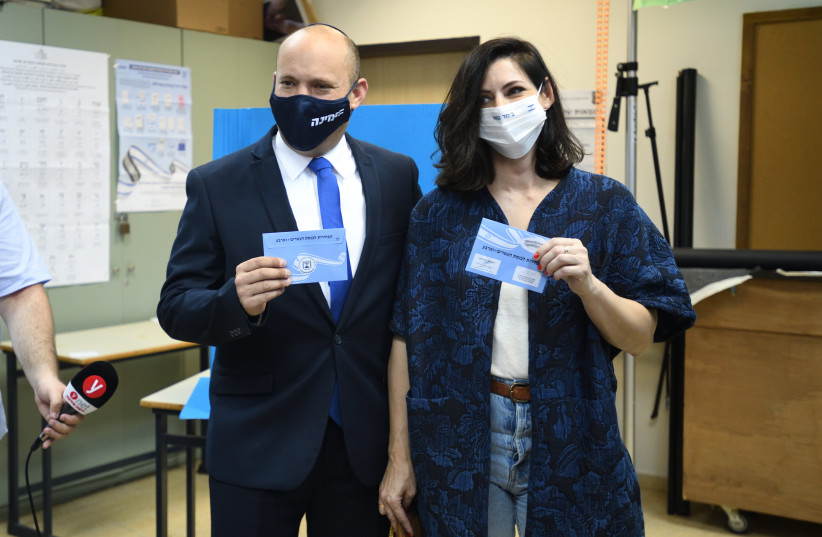Prime Minister Naftali Bennett found himself the center of controversy this month after the government banned tourists and put in place quarantines over concerns about a new COVID variant. The controversy erupted after the government had advised Israelis to avoid unnecessary trips abroad, while Bennett’s wife and children were heading abroad for a vacation.
In short, Israelis were being told to stay home again, while the powerful went off on holiday.
That, at least, was the contradictory and hypocritical message that appeared to be raised. Bennett defended his family’s travel. “It is important to me that you know something about Gilat,” Bennett wrote. “She is the most charming and kind-hearted person I know. And, like many parents, we both have a desire to make our children as happy as possible, especially in light of a not-so-simple year in which their lives have been completely turned upside down.”
Travel became an Israeli political football. However it is emblematic of a larger issue. Throughout the pandemic there has been a perception that politicians put in place one rule for average people, and the rules don’t seem to apply to the powerful, connected, wealthy and ruling class. In December 2020 Ontario Premier Doug Ford announced the resignation of his finance minister “who took a trip to the Caribbean while the province remained under lockdown,” according to the BBC. Other Canadian politicians also resigned amid travel scandals.
In June 2021 UK Health Secretary Matt Hancock resigned after breaking social distancing guidelines. A top UK scientist advising the government on stringent COVID restrictions also resigned in May 2020. In April 2020 an Australian minister resigned after breaching a ban on non-essential travel. The Independent noted that “Don Harwin, the New South Wales arts minister, was caught relocating to his holiday home on the Central Coast and subsequently fined A$1,000 ($709).”


It wasn’t just government ministers jetting off for vacations while citizens were being given fines and chased down for having birthday parties for their kids, it was also the super rich living a normal life during COVID while everyone else was locked down. Consider, for instance, stories in August 2020 about parties in the Hamptons where the wealthy had access to fast testing so they could gather without the same danger the poor face.
In Israel there were numerous cases of powerful politicians breaking the very guidelines they put in place for average people. Then-president Reuven Rivlin apparently hosted a family member on Passover in April 2020, at the start of the pandemic, when other Israelis were told not to visit family. There were other examples. Israelis were locked down again and again for holidays, while some of the powerful and connected seem to have hosted family. In other countries the powerful simply ditched the cities for cozy second homes. In other cases American politicians were photographed inside without masks, while they were busy virtue signaling about the need for masks. California’s governor, for instance, attended a party without masks in November 2020, according to reports. Other events appeared to show world leaders donning masks for the cameras and then taking them off when meeting.
The end result is that the public has felt in many countries that there is something strange about this pandemic. If the pandemic is as dangerous as governments and health officials have indicated it is, then it is unclear why policies seem to apply to average people, but not their leaders. For this reason a chorus, particularly on the Right and among populists and conspiracy theorists, has grown that accuses the leaders of hypocrisy.
In March 2021 US Senator Rand Paul (R-Kentucky) slammed the narrative about masks. “You’re telling everybody to wear a mask, whether they’ve had an infection or a vaccine,” Paul said to Anthony Fauci, director of the National Institute of Allergy and Infectious Diseases, according to a CNN report. “If people that have had the vaccine or have had the infection... if we’re not spreading the infection, isn’t it just theater?” Paul asked. Fauci said the masks were not theater.
THE OVERALL question the hypocrisy raises is whether the leaders and well-connected are simply doing what average people do, avoiding some guidelines, or whether they are telling the public one thing, while they know something else.
This is because the threat of COVID is generally a threat that relates to large numbers. The concerns of governments are not necessarily each case of COVID, but that among tens of thousands of cases there will be enough serious cases to overwhelm hospitals. Many governments haven’t bothered to invest in special COVID hospitals, as China did in Wuhan when the pandemic began, so they gamble on keeping transmission rates relatively low.
That means that for the super-wealthy and powerful, COVID may not be as much of a concern because they aren’t going to overwhelm hospitals and they know that with modern treatments most COVID cases are not fatal. That is why many of the world’s leaders have had COVID, from UK Prime Minister Boris Johnson to Donald Trump, and so have many celebrities, and most survived. The goal of governments when they cut off travel is to reduce cases, not get to zero.
Democratic governments have been particularly susceptible to this appearance of hypocrisy. This is partly because they are transparent. That there are many news stories about government ministers resigning due to breaking the guidelines shows that these governments are attempting to act responsibly.
That is one of those biases against democracies that Jeanne Kirkpatrick and Daniel Patrick Moynihan identified in the 1980s: “Democracies tend to be held to higher standards and appear to abuse human rights more because they are transparent and we know about the abuses.” Dictatorships never admit their failings and their leaders are not held accountable. Nevertheless, too many democracies included too many jet-set types who violated COVID guidelines while their communities were busy shouting at others to observe the same guidelines.
Furthermore, big tech companies openly censored basic questions about the pandemic, such as legitimate concerns about its origins and initial cover-up of its spread. The fact that democracies seemed to mobilize social media giants, where most people now get their news, to prevent people from even mentioning a leading research lab in Wuhan, where experts had been studying coronaviruses prior to the outbreak of a coronavirus, was historic in its attempt to stamp out basic discussion in democracies.
In that sense democratic publics, who are supposed to question things, speak truth to power and be more educated because of the vibrant free exchange of ideas, were kept in the dark the same way dictatorships keep their publics in the dark.
Once the public was misled, such as US media and health officials telling people not to use masks in February and March 2020, while the World Health Organization praised China for employing masks at the same time, the public was easily influenced by conspiracies. Conspiracies breed not only among the ignorant or the misled, but also among the highly intelligent who wonder about patterns and are sometimes prone to see simplistic conspiratorial answers in chaotic data points. Hence masking became controversial in the US and so did vaccines.
Legitimate questions about whether people should trust rapidly available new treatments, led to bizarre choices to take other experimental treatments. The appearance of inequity, with leaders hosting fancy parties without masks or jetting off to the Caribbean for vacations while the public was shouted at to “stay home” fueled this.
Two years into the pandemic the choice of Bennett’s family to take a vacation, while others feel they are trapped in Israel, is part of this wider concern. However, it is also evidence of the politicization of the pandemic. Israel has generally performed well in some details during the COVID threat, such as vaccine roll-outs, because public health has not become too politicized. Yet, every time reports indicate that certain communities got special favors, such as ultra-Orthodox communities returning to school while other schools were closed, the public is less likely to follow guidelines. From the government health officials’ perspective, that may be acceptable since their numbers are not based on 100% adherence, but rather the idea that most people will adhere.
A recent poll on Channel 12 indicated only 6% of Israelis think COVID is a pressing priority. They are more concerned about the cost of living and crime. As such the story of the prime minister’s family going on vacation may be more about a contrast with the cost of living fears, as others vacation while Israelis can’t afford decent hotels, than about COVID.
That means the real anger and distrust created by COVID hypocrisy is related to a feeling in many democracies that a neoliberal world order, stalled social mobility, growing wealth gaps and inequality and political divisions are the real threat.
COVID policies may be merely a symptom accelerating these divisions. Even if governments beat the pandemic, they may find the long aftershock has been set in motion.
